Skills for Higher Education Report: Cultural Analysis and Suggestions
VerifiedAdded on 2023/02/02
|6
|1225
|95
Report
AI Summary
This report provides a critical evaluation of suggestions related to skills for higher education, considering Hofstede's cultural dimensions. The report analyzes various suggestions, including the impact of culture on organizational behavior, the importance of individualist culture, and the implications of uncertainty avoidance. It agrees and disagrees with the suggestions, providing justifications based on cultural considerations and international business practices. The report also offers additional suggestions, emphasizing the need to consider power dynamics and national cultural elements when expanding globally. The author stresses the importance of understanding consumer behavior based on national culture to enhance business profitability and success. The report references relevant books and journals to support its analysis, offering valuable insights for students and professionals in leadership management and international business.

Skills for higher
education
education
Paraphrase This Document
Need a fresh take? Get an instant paraphrase of this document with our AI Paraphraser
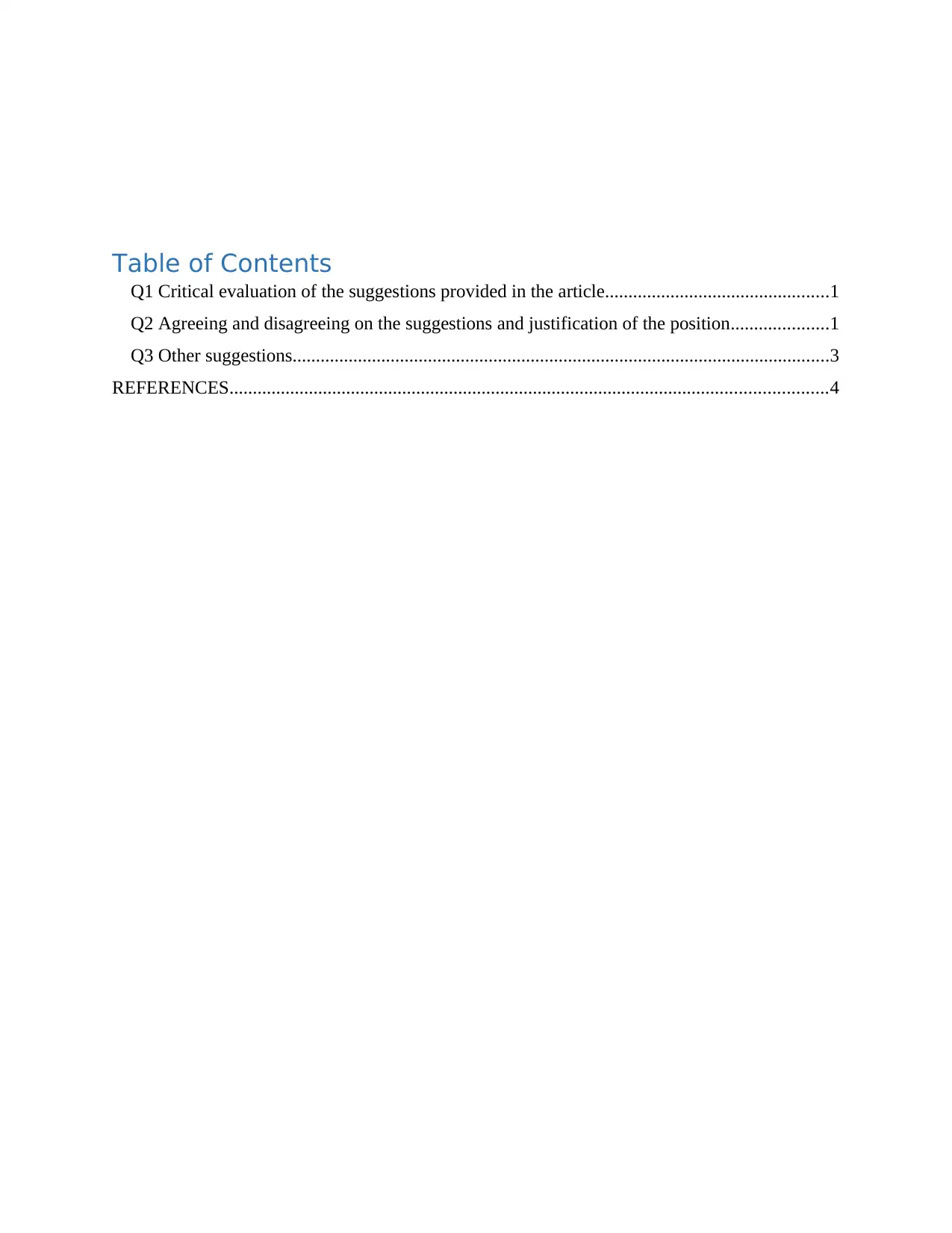
Table of Contents
Q1 Critical evaluation of the suggestions provided in the article................................................1
Q2 Agreeing and disagreeing on the suggestions and justification of the position.....................1
Q3 Other suggestions...................................................................................................................3
REFERENCES................................................................................................................................4
Q1 Critical evaluation of the suggestions provided in the article................................................1
Q2 Agreeing and disagreeing on the suggestions and justification of the position.....................1
Q3 Other suggestions...................................................................................................................3
REFERENCES................................................................................................................................4
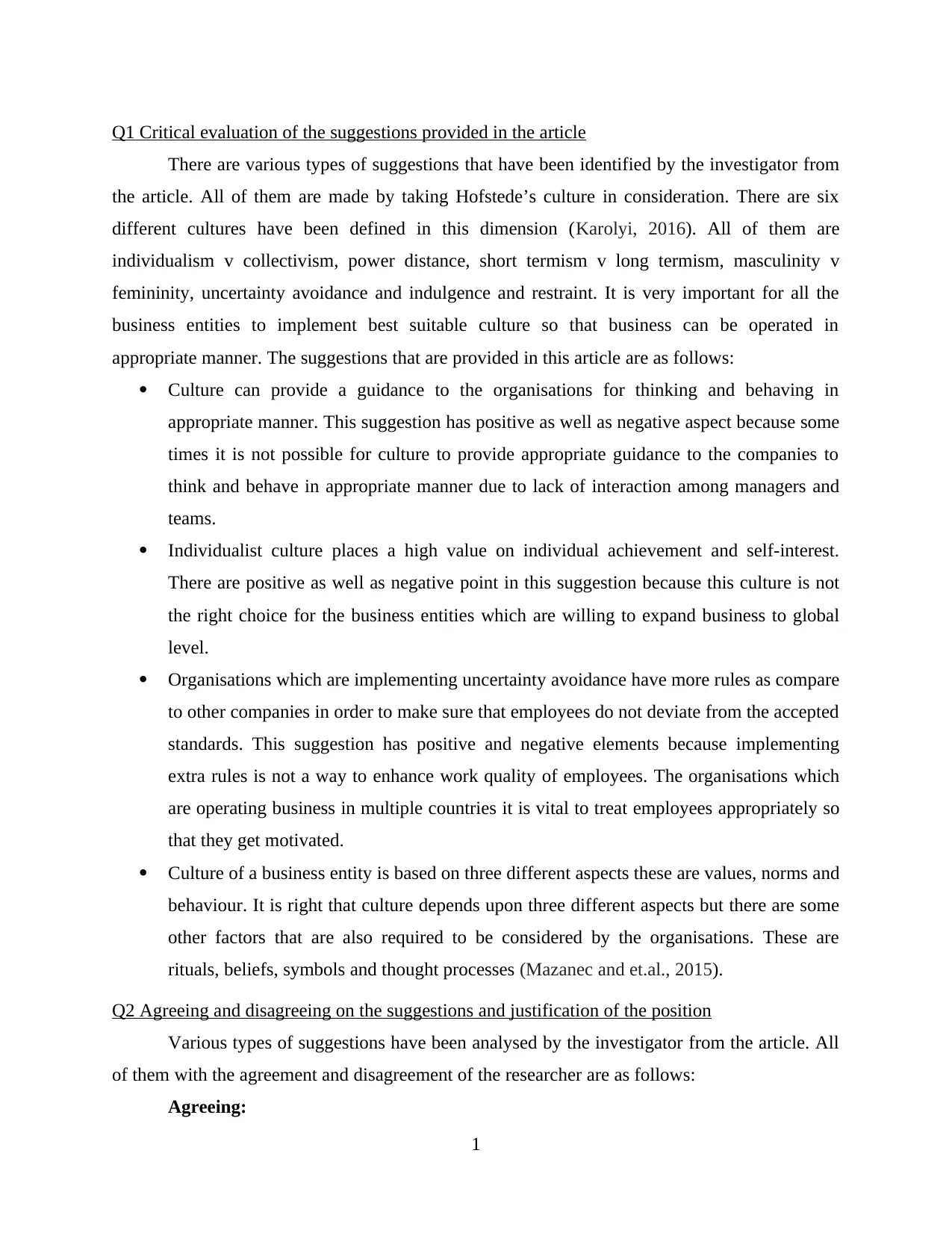
Q1 Critical evaluation of the suggestions provided in the article
There are various types of suggestions that have been identified by the investigator from
the article. All of them are made by taking Hofstede’s culture in consideration. There are six
different cultures have been defined in this dimension (Karolyi, 2016). All of them are
individualism v collectivism, power distance, short termism v long termism, masculinity v
femininity, uncertainty avoidance and indulgence and restraint. It is very important for all the
business entities to implement best suitable culture so that business can be operated in
appropriate manner. The suggestions that are provided in this article are as follows:
Culture can provide a guidance to the organisations for thinking and behaving in
appropriate manner. This suggestion has positive as well as negative aspect because some
times it is not possible for culture to provide appropriate guidance to the companies to
think and behave in appropriate manner due to lack of interaction among managers and
teams.
Individualist culture places a high value on individual achievement and self-interest.
There are positive as well as negative point in this suggestion because this culture is not
the right choice for the business entities which are willing to expand business to global
level.
Organisations which are implementing uncertainty avoidance have more rules as compare
to other companies in order to make sure that employees do not deviate from the accepted
standards. This suggestion has positive and negative elements because implementing
extra rules is not a way to enhance work quality of employees. The organisations which
are operating business in multiple countries it is vital to treat employees appropriately so
that they get motivated.
Culture of a business entity is based on three different aspects these are values, norms and
behaviour. It is right that culture depends upon three different aspects but there are some
other factors that are also required to be considered by the organisations. These are
rituals, beliefs, symbols and thought processes (Mazanec and et.al., 2015).
Q2 Agreeing and disagreeing on the suggestions and justification of the position
Various types of suggestions have been analysed by the investigator from the article. All
of them with the agreement and disagreement of the researcher are as follows:
Agreeing:
1
There are various types of suggestions that have been identified by the investigator from
the article. All of them are made by taking Hofstede’s culture in consideration. There are six
different cultures have been defined in this dimension (Karolyi, 2016). All of them are
individualism v collectivism, power distance, short termism v long termism, masculinity v
femininity, uncertainty avoidance and indulgence and restraint. It is very important for all the
business entities to implement best suitable culture so that business can be operated in
appropriate manner. The suggestions that are provided in this article are as follows:
Culture can provide a guidance to the organisations for thinking and behaving in
appropriate manner. This suggestion has positive as well as negative aspect because some
times it is not possible for culture to provide appropriate guidance to the companies to
think and behave in appropriate manner due to lack of interaction among managers and
teams.
Individualist culture places a high value on individual achievement and self-interest.
There are positive as well as negative point in this suggestion because this culture is not
the right choice for the business entities which are willing to expand business to global
level.
Organisations which are implementing uncertainty avoidance have more rules as compare
to other companies in order to make sure that employees do not deviate from the accepted
standards. This suggestion has positive and negative elements because implementing
extra rules is not a way to enhance work quality of employees. The organisations which
are operating business in multiple countries it is vital to treat employees appropriately so
that they get motivated.
Culture of a business entity is based on three different aspects these are values, norms and
behaviour. It is right that culture depends upon three different aspects but there are some
other factors that are also required to be considered by the organisations. These are
rituals, beliefs, symbols and thought processes (Mazanec and et.al., 2015).
Q2 Agreeing and disagreeing on the suggestions and justification of the position
Various types of suggestions have been analysed by the investigator from the article. All
of them with the agreement and disagreement of the researcher are as follows:
Agreeing:
1
⊘ This is a preview!⊘
Do you want full access?
Subscribe today to unlock all pages.

Trusted by 1+ million students worldwide
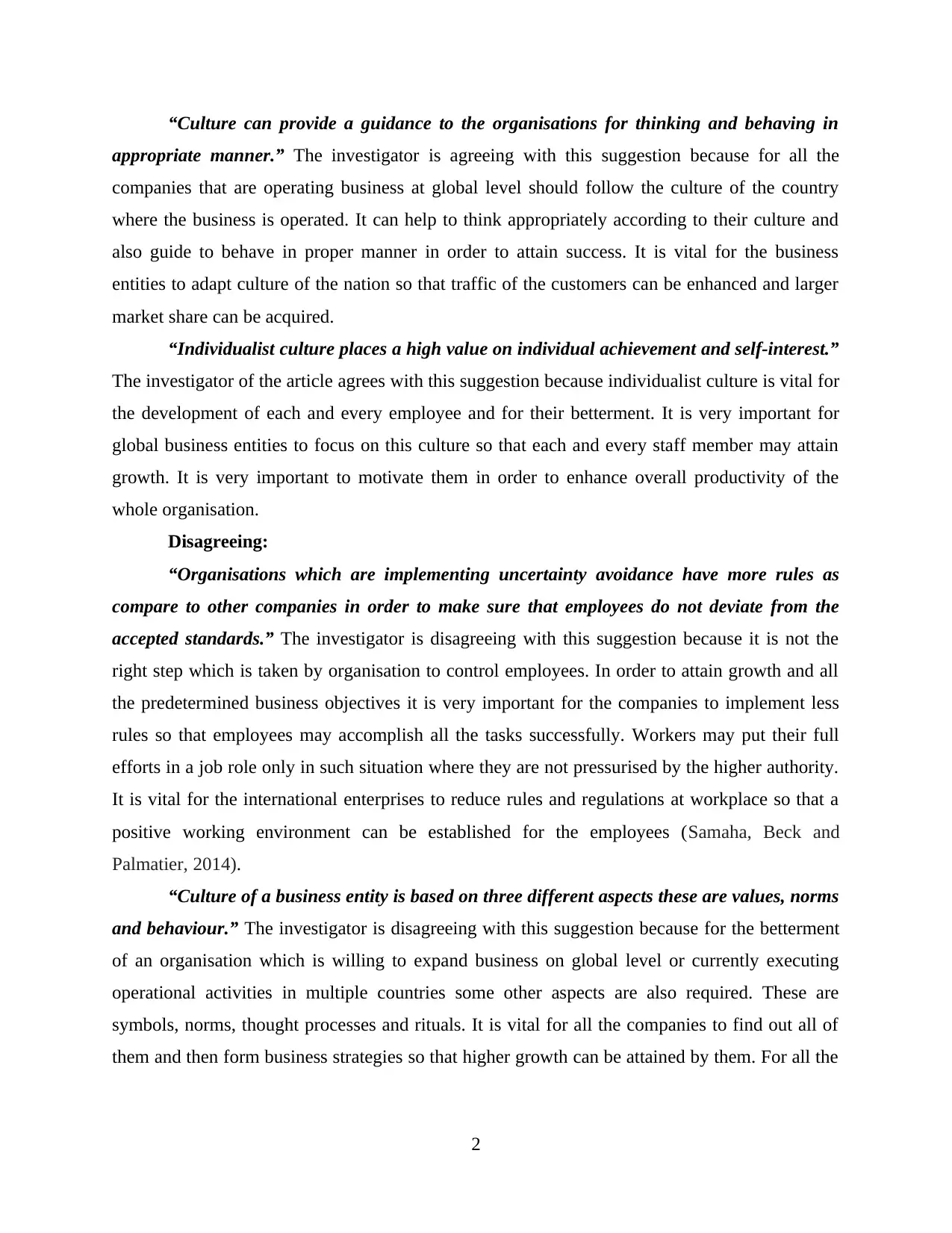
“Culture can provide a guidance to the organisations for thinking and behaving in
appropriate manner.” The investigator is agreeing with this suggestion because for all the
companies that are operating business at global level should follow the culture of the country
where the business is operated. It can help to think appropriately according to their culture and
also guide to behave in proper manner in order to attain success. It is vital for the business
entities to adapt culture of the nation so that traffic of the customers can be enhanced and larger
market share can be acquired.
“Individualist culture places a high value on individual achievement and self-interest.”
The investigator of the article agrees with this suggestion because individualist culture is vital for
the development of each and every employee and for their betterment. It is very important for
global business entities to focus on this culture so that each and every staff member may attain
growth. It is very important to motivate them in order to enhance overall productivity of the
whole organisation.
Disagreeing:
“Organisations which are implementing uncertainty avoidance have more rules as
compare to other companies in order to make sure that employees do not deviate from the
accepted standards.” The investigator is disagreeing with this suggestion because it is not the
right step which is taken by organisation to control employees. In order to attain growth and all
the predetermined business objectives it is very important for the companies to implement less
rules so that employees may accomplish all the tasks successfully. Workers may put their full
efforts in a job role only in such situation where they are not pressurised by the higher authority.
It is vital for the international enterprises to reduce rules and regulations at workplace so that a
positive working environment can be established for the employees (Samaha, Beck and
Palmatier, 2014).
“Culture of a business entity is based on three different aspects these are values, norms
and behaviour.” The investigator is disagreeing with this suggestion because for the betterment
of an organisation which is willing to expand business on global level or currently executing
operational activities in multiple countries some other aspects are also required. These are
symbols, norms, thought processes and rituals. It is vital for all the companies to find out all of
them and then form business strategies so that higher growth can be attained by them. For all the
2
appropriate manner.” The investigator is agreeing with this suggestion because for all the
companies that are operating business at global level should follow the culture of the country
where the business is operated. It can help to think appropriately according to their culture and
also guide to behave in proper manner in order to attain success. It is vital for the business
entities to adapt culture of the nation so that traffic of the customers can be enhanced and larger
market share can be acquired.
“Individualist culture places a high value on individual achievement and self-interest.”
The investigator of the article agrees with this suggestion because individualist culture is vital for
the development of each and every employee and for their betterment. It is very important for
global business entities to focus on this culture so that each and every staff member may attain
growth. It is very important to motivate them in order to enhance overall productivity of the
whole organisation.
Disagreeing:
“Organisations which are implementing uncertainty avoidance have more rules as
compare to other companies in order to make sure that employees do not deviate from the
accepted standards.” The investigator is disagreeing with this suggestion because it is not the
right step which is taken by organisation to control employees. In order to attain growth and all
the predetermined business objectives it is very important for the companies to implement less
rules so that employees may accomplish all the tasks successfully. Workers may put their full
efforts in a job role only in such situation where they are not pressurised by the higher authority.
It is vital for the international enterprises to reduce rules and regulations at workplace so that a
positive working environment can be established for the employees (Samaha, Beck and
Palmatier, 2014).
“Culture of a business entity is based on three different aspects these are values, norms
and behaviour.” The investigator is disagreeing with this suggestion because for the betterment
of an organisation which is willing to expand business on global level or currently executing
operational activities in multiple countries some other aspects are also required. These are
symbols, norms, thought processes and rituals. It is vital for all the companies to find out all of
them and then form business strategies so that higher growth can be attained by them. For all the
2
Paraphrase This Document
Need a fresh take? Get an instant paraphrase of this document with our AI Paraphraser
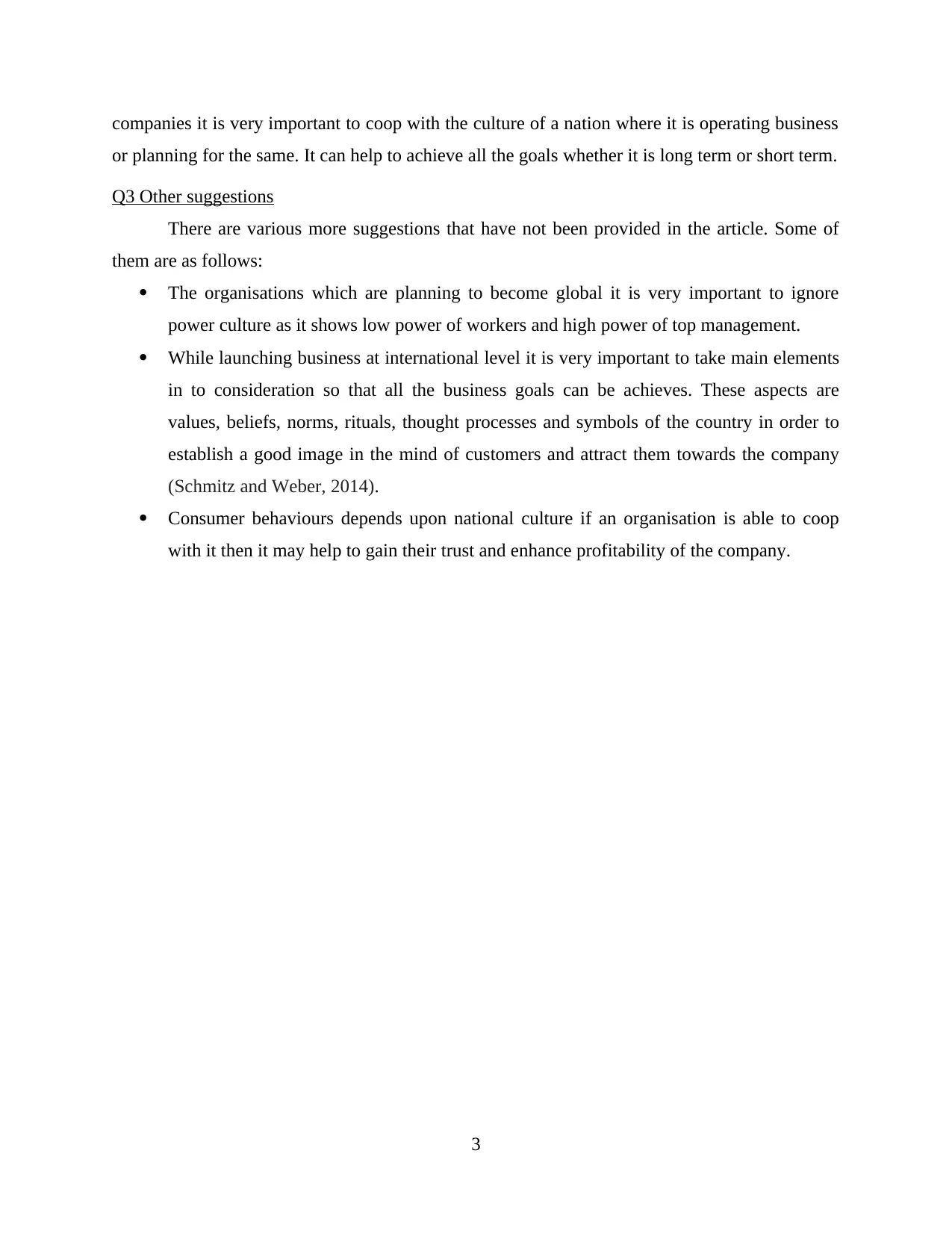
companies it is very important to coop with the culture of a nation where it is operating business
or planning for the same. It can help to achieve all the goals whether it is long term or short term.
Q3 Other suggestions
There are various more suggestions that have not been provided in the article. Some of
them are as follows:
The organisations which are planning to become global it is very important to ignore
power culture as it shows low power of workers and high power of top management.
While launching business at international level it is very important to take main elements
in to consideration so that all the business goals can be achieves. These aspects are
values, beliefs, norms, rituals, thought processes and symbols of the country in order to
establish a good image in the mind of customers and attract them towards the company
(Schmitz and Weber, 2014).
Consumer behaviours depends upon national culture if an organisation is able to coop
with it then it may help to gain their trust and enhance profitability of the company.
3
or planning for the same. It can help to achieve all the goals whether it is long term or short term.
Q3 Other suggestions
There are various more suggestions that have not been provided in the article. Some of
them are as follows:
The organisations which are planning to become global it is very important to ignore
power culture as it shows low power of workers and high power of top management.
While launching business at international level it is very important to take main elements
in to consideration so that all the business goals can be achieves. These aspects are
values, beliefs, norms, rituals, thought processes and symbols of the country in order to
establish a good image in the mind of customers and attract them towards the company
(Schmitz and Weber, 2014).
Consumer behaviours depends upon national culture if an organisation is able to coop
with it then it may help to gain their trust and enhance profitability of the company.
3
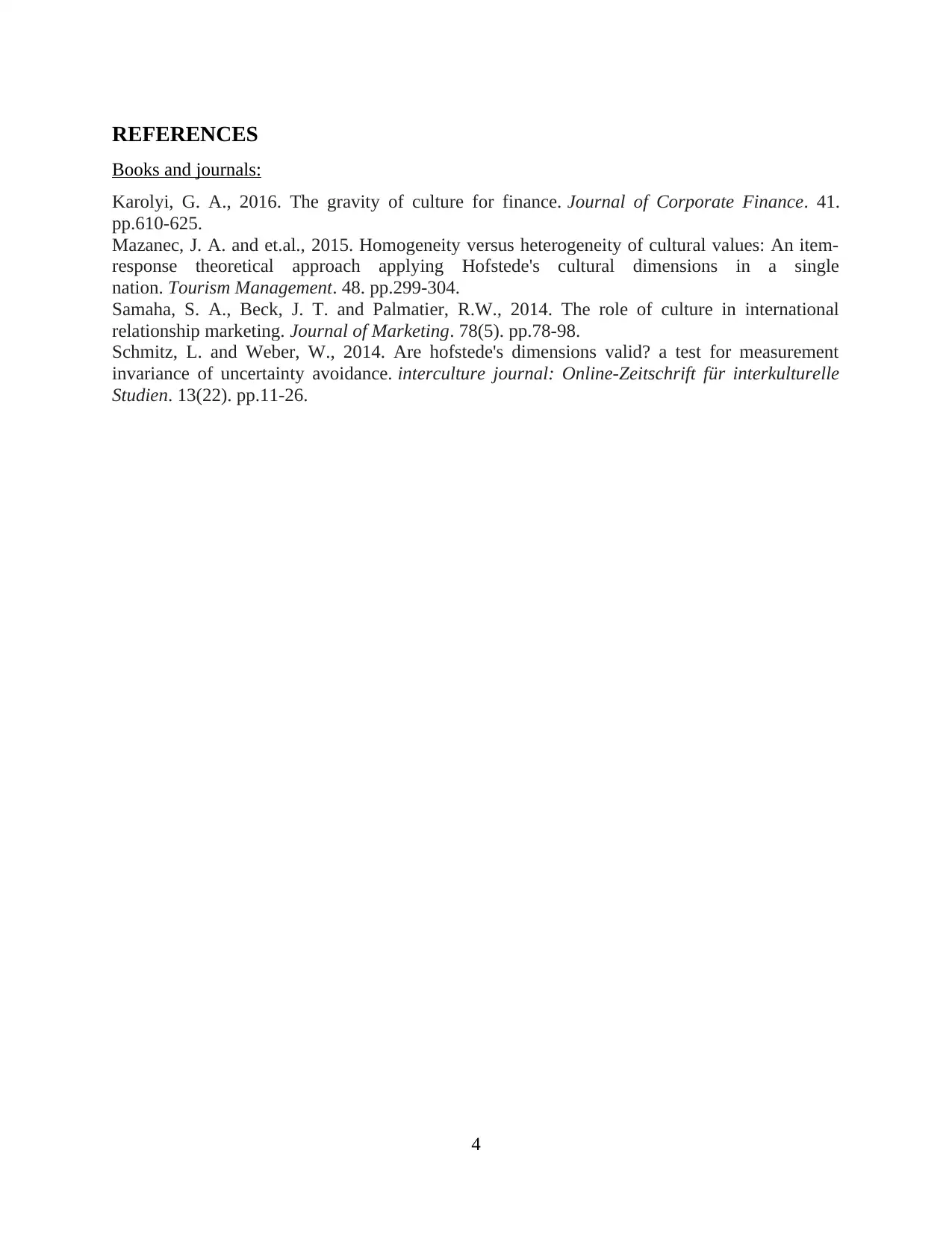
REFERENCES
Books and journals:
Karolyi, G. A., 2016. The gravity of culture for finance. Journal of Corporate Finance. 41.
pp.610-625.
Mazanec, J. A. and et.al., 2015. Homogeneity versus heterogeneity of cultural values: An item-
response theoretical approach applying Hofstede's cultural dimensions in a single
nation. Tourism Management. 48. pp.299-304.
Samaha, S. A., Beck, J. T. and Palmatier, R.W., 2014. The role of culture in international
relationship marketing. Journal of Marketing. 78(5). pp.78-98.
Schmitz, L. and Weber, W., 2014. Are hofstede's dimensions valid? a test for measurement
invariance of uncertainty avoidance. interculture journal: Online-Zeitschrift für interkulturelle
Studien. 13(22). pp.11-26.
4
Books and journals:
Karolyi, G. A., 2016. The gravity of culture for finance. Journal of Corporate Finance. 41.
pp.610-625.
Mazanec, J. A. and et.al., 2015. Homogeneity versus heterogeneity of cultural values: An item-
response theoretical approach applying Hofstede's cultural dimensions in a single
nation. Tourism Management. 48. pp.299-304.
Samaha, S. A., Beck, J. T. and Palmatier, R.W., 2014. The role of culture in international
relationship marketing. Journal of Marketing. 78(5). pp.78-98.
Schmitz, L. and Weber, W., 2014. Are hofstede's dimensions valid? a test for measurement
invariance of uncertainty avoidance. interculture journal: Online-Zeitschrift für interkulturelle
Studien. 13(22). pp.11-26.
4
⊘ This is a preview!⊘
Do you want full access?
Subscribe today to unlock all pages.

Trusted by 1+ million students worldwide
1 out of 6
Related Documents
Your All-in-One AI-Powered Toolkit for Academic Success.
+13062052269
info@desklib.com
Available 24*7 on WhatsApp / Email
![[object Object]](/_next/static/media/star-bottom.7253800d.svg)
Unlock your academic potential
Copyright © 2020–2026 A2Z Services. All Rights Reserved. Developed and managed by ZUCOL.





